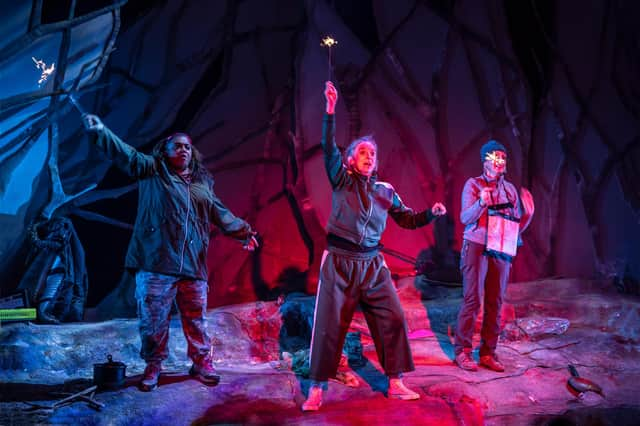'It's about being aggressive, vulnerable, wounded and insecure' - Tim Firth on Sheila's Island


If you'd have asked Tim Firth in 1992 whether his all-male comedy Neville's Island could have been recast with women, he would have given a speedy answer: "No."
Back then, the playwright was certain it was exclusively about men. This play about four office workers on a team-building exercise in the Lake District was about bullying, competitiveness and bluster – characteristics that seemed very male.
Advertisement
Hide AdA couple of years after its premiere in Scarborough, it was nominated for an Olivier Award for best comedy. The cast of a 1998 film adaptation included Timothy Spall and Martin Clunes, while a West End production in 2014 starred Robert Webb, Neil Morrissey, Adrian Edmondson and Miles Jupp.
So even though the playwright has scored major hits with female-led shows such as Calendar Girls, about the famous risqué photoshoot by the Rylstone & District Women's Institute, and The Band, about four long-time Take That fans, it did not occur to him that Neville's Island could work without men.
That is until he was approached by director Joanna Read of the Yvonne Arnaud Theatre in Guildford who had seen the potential of a gender-swapped version. "I look back with shame and some concern over my career about how many of the best ideas I've had have come from other people," Firth laughs. "I had the calendar of naked WI women on my wall for a whole year before somebody rang up and said, 'Have you ever thought of turning this into a film?' That's exactly what happened here."
Reed's touring production stars Sara Crowe, Rina Fatania, Judy Flynn and Abigail Thaw who are now the outward-bound middle-managers trying to survive the night on Derwentwater.
Firth was delighted to realise how few adjustments he had to make for Neville's Island to become Sheila's Island. His changes have been the kind any playwright might make in returning to an old script. He has nipped and tucked, and updated the references to technology (the size of mobile phones has changed repeatedly over the play's life), but little else. "Locking it into how women I knew would talk to each other just speeded it up," he says. "It sharpened all the arrows."
Apart from that, he has held on to the shape of the play, its emotional relationships and everything that makes it funny. He discovered he had not written a play about what it is to be male but about what it is to be human. "It's about being aggressive, vulnerable, wounded and insecure," he says.
Advertisement
Hide AdThat it was Read who had come up with the idea emboldened the playwright to take the proposition seriously. "I was very interested that it had come from a woman who said, 'This deserves to be looked at from another angle,'" he says. "The young me probably wouldn't have agreed to it, partly because an all-female board room would have been such an extraordinary thing in 1992 that it would have become the issue.
"But also, at 28, I probably would have doubted that women would behave as badly towards each other as men do. The intervening years have disabused me of that. That attitude is as unrealistic as it is patronising. Women will attack each other in defter ways with different knives, but they still draw the same effect as men do when they fight."
Advertisement
Hide AdIf his 28-year-old self regarded women as confident, balanced and assured – because, to him, that is how they so often seemed – it would have been at the expense of showing qualities that were less attractive, but no less true. "What that does is deny female actors the chance to play hideous, grotesque parts that are so much fun to play, so much fun to watch and much more realistic," he says. "Women will be as guilty as men of workplace bullying and the relentless sarcasm that eventually makes you want to kill someone."
Firth's favourite playwrights include Willy Russell, Alan Ayckbourn and Jack Rosenthal, writers who have plenty of serious things to say, but always seek to entertain first. The implicit joke of Sheila's Island is the low-stakes nature of the women's adventure. They are not lost at sea or stranded in the jungle, but temporarily detained on an island in the Lake District.
Their hysterical reaction – to the situation and to each other – is out of proportion to the threat. That is what fuels the comedy and, ultimately, exposes the vulnerabilities at the play's sensitive heart.
"The initial premise has some comedy within it," says Firth. "It has a spring to it. I don't know where you'd start otherwise. The only times I've made mistakes as a playwright was coming out of university when someone said, 'We want a play about homelessness.' Fatal! I ended up writing a comedy about homelessness because my natural instinct was to offset it. They were early lessons to learn. Now I write for fun. If I wasn't doing that, I would feel I was the wrong kind of writer."
After the last couple of years of Covid restrictions, Firth is overjoyed about the staging not only of this play, but also Now Is Good, premiering in Chester in May. He thinks the pandemic has given us a renewed appetite for laughter. "You want comedy," he says. "You want escapism. You want fun. I adore standing at the back of a theatre and hearing an audience laugh, sing and rise up."
Sheila's Island is at the King's Theatre, Edinburgh, from 1-5 March, https://www.capitaltheatres.com/
A message from the Editor:
Advertisement
Hide AdThank you for reading this article. We're more reliant on your support than ever as the shift in consumer habits brought about by coronavirus impacts our advertisers.
If you haven't already, please consider supporting our trusted, fact-checked journalism by taking out a digital subscription at https://www.scotsman.com/subscriptions